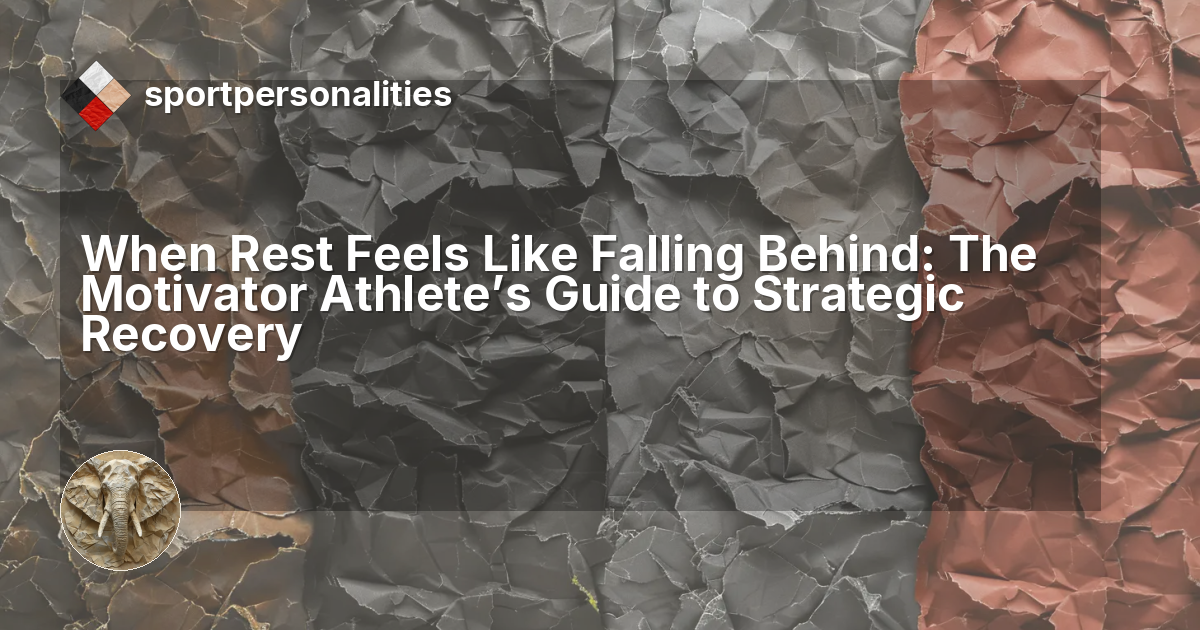Imagine a Motivator athlete looking at their social media after a hard week of training. Their teammates' posts celebrate rest days and recovery wins. This athlete, on the other hand, feels stuck in a strange limbo. They know they should rest, but they're worried that taking time off will make them fall behind or make coaches and teammates forget about their contributions.
 The Motivator (ESTC) faces a unique challenge in recovery. Their identity is based on both personal and group success. Rest days don't have the real signs of progress or the social support that keeps them going. When the world celebrates hard work and always getting better, taking a break can feel like stepping away from both recognition and the team you want to help grow.
The Motivator (ESTC) faces a unique challenge in recovery. Their identity is based on both personal and group success. Rest days don't have the real signs of progress or the social support that keeps them going. When the world celebrates hard work and always getting better, taking a break can feel like stepping away from both recognition and the team you want to help grow.
This article looks at how Motivators can turn a stressful task that makes you anxious into a strategic advantage. They'll learn how to turn rest into a skill that improves both their own performance and the way their team works together.
Step 1: Building a Strong Foundation for Motivator Athletes
At the most basic level, Motivators need to change how they think about what recovery means. It's not gone. It's not invisibility. Recovery represents the strategic work that happens between visible efforts, the biological processes that convert training stress into actual improvement.
This reframe matters because Motivators often measure their worth through observable contributions. A training session produces sweat, effort, and social proof. A rest day produces nothing they can post, share, or discuss in team meetings. This creates a psychological trap where the activities that build performance feel less valuable than the activities that showcase it.
The foundation begins with data collection. Motivators excel at strategic thinking, so they can channel that strength into recovery metrics. Tracking resting heart rate, sleep quality, and subjective energy levels creates tangible evidence that rest produces results. When a Motivator sees their morning heart rate drop by five beats per minute after proper recovery, they gain concrete proof that rest works.
Communication also forms a critical foundation element. Motivators fear being overlooked during recovery periods. The solution isn't to skip rest, it's to make recovery visible to the team. Sharing recovery strategies in group chats, discussing sleep optimization with teammates, or posting about active recovery sessions maintains social connection without sacrificing actual rest.
At this stage, the goal isn't perfect recovery practices. It's building belief that rest serves both personal performance and team success. A Motivator who can articulate why they're resting, and how it will help them contribute more effectively next week, has laid the groundwork for sustainable recovery habits.
Stage 2: Intermediate Development
Intermediate-level recovery skills involve integrating rest into the broader performance strategy rather than treating it as an afterthought. Motivators at this stage recognize recovery windows and adjust accordingly, but they still struggle with the emotional experience of stepping back when recognition opportunities arise.
The key development here centers on strategic periodization aligned with team needs. A Motivator might identify that their team faces its toughest competition in three weeks. Working backward, they can design a recovery schedule that ensures peak performance when it matters most for collective success. This transforms rest from "taking time off" into "preparing for the moment when the team needs me most."
Social dynamics become more sophisticated at this level. Rather than simply announcing rest days, intermediate Motivators start facilitating team recovery culture. They might organize group yoga sessions, create team challenges around sleep quality, or share research about recovery with teammates. This approach satisfies their need for recognition and team contribution while actually recovering.
Decision-making speed improves during this stage. Early-stage Motivators often overthink rest decisions, analyzing whether they've earned downtime or wondering if one more session might produce breakthrough results. Intermediate practitioners develop clearer frameworks: if three specific indicators appear (elevated heart rate, persistent fatigue, declining performance), rest becomes non-negotiable regardless of external pressures.
The intermediate Motivator also begins experimenting with active recovery modalities that provide social validation while promoting physiological restoration. Swimming, hiking, or skill work at reduced intensity offers the visibility and team connection they crave without the stress that prevents recovery. They're learning to satisfy psychological needs while respecting biological requirements.
Discover Your Sport Personality
This article explores one of 16 profiles. Find out which one you are and unlock a personalized blueprint for your athletic journey.
Take the Free TestStage 3: Advanced Integration
Advanced recovery integration represents a fundamental shift in identity. The Motivator no longer views rest as separate from training, recovery becomes training. This cognitive reframe eliminates the internal conflict that plagued earlier stages.
At this level, Motivators leverage their strategic thinking to create sophisticated recovery protocols matched to specific training phases. They might implement aggressive recovery strategies after high-intensity weeks, knowing this approach will enable them to train harder when the team needs elevated effort. They've internalized that recovery quality directly determines training quality, which determines performance quality.
The advanced Motivator also develops nuanced understanding of individual versus team recovery needs. Sometimes personal rest serves team success by ensuring they're available for critical moments. Other times, showing up for light team activities despite personal fatigue strengthens collective bonds. This isn't about ignoring recovery, it's about strategic deployment of energy based on context.
Communication reaches new sophistication. Rather than seeking validation for resting, advanced Motivators educate others about recovery science. They might lead team discussions about sleep architecture, present research on overtraining syndrome, or mentor younger athletes struggling with rest anxiety. This positions them as recovery leaders, satisfying their need for recognition while promoting team-wide performance improvements.
These athletes also master the art of productive rest, engaging in activities that restore physical capacity while maintaining psychological engagement. They might analyze game film during rest days, develop new team strategies, or study opponents. Their minds stay active and valuable to the team even when their bodies recover.
Perhaps most importantly, advanced Motivators build systems that prevent the need for reactive recovery. They schedule regular rest before fatigue becomes debilitating. They communicate proactively with coaches about recovery needs before performance declines. This proactive approach demonstrates maturity and earns the consistent recognition they seek.
Stage 4: Mastery Expression
Mastery-level Motivators embody a paradox: they achieve maximum recognition partly through their willingness to rest strategically. Their reputation includes not just performance excellence but wisdom about the full training cycle. Coaches trust them. Teammates follow their example. Their influence extends beyond personal achievement into shaping team culture.
These elite practitioners have eliminated the fear of being overlooked during rest periods. They've built such consistent credibility that their value remains unquestioned even during downtime. When they announce a recovery day, teammates and coaches recognize it as strategic preparation rather than weakness or disengagement.
Mastery also involves intuitive recovery adjustments based on subtle physiological and psychological signals. While beginners need obvious symptoms to justify rest, masters detect minor variations in motivation, coordination, or enthusiasm that indicate recovery needs. They trust these signals without requiring external validation or extensive analysis.
The mastery-level Motivator seamlessly integrates recovery into team leadership. They might advocate for team-wide rest days when they sense collective fatigue, even if they personally feel capable of continuing. This demonstrates their commitment to collective success over personal recognition, a mature expression of their core values.
These athletes also model recovery for younger teammates, creating legacy impact beyond their playing career. They openly discuss rest strategies, share their evolution from recovery-resistant to recovery-embracing, and normalize rest as performance enhancement rather than weakness. Their influence multiplies their impact across the entire program.
At mastery level, recovery becomes effortless because it's fully aligned with identity. The Motivator no longer battles internal resistance about resting. They recognize that strategic recovery enables them to achieve their deepest desire: meaningful recognition while inspiring others to reach their full potential. Rest serves both aims simultaneously.
Assessing Your Current Stage
Honest self-assessment requires examining both behaviors and underlying beliefs. Foundation-stage Motivators typically feel guilty or anxious during rest, frequently checking whether teammates are training without them, and often cutting recovery short when recognition opportunities appear.
Intermediate practitioners schedule rest more consistently but still experience emotional discomfort. They've developed some systems but haven't fully internalized that recovery serves performance. They might rest when exhausted but rarely rest preemptively. Their recovery communication focuses on justifying downtime rather than educating others.
Advanced Motivators demonstrate proactive recovery planning and minimal emotional resistance. They discuss rest openly without defensiveness. They've built credibility that survives rest periods. However, they might still struggle with recovery during high-stakes situations or when feeling overlooked by coaches.
Mastery reveals itself through consistent behavior across all contexts. These Motivators rest effectively even during championship weeks or when competing for starting positions. They've built identity around complete preparation, including recovery, rather than just visible effort. They influence team recovery culture as naturally as they influence training culture.
Progression between stages isn't linear. A Motivator might demonstrate advanced skills in familiar environments but regress to foundation-level behaviors when changing teams or facing new competitive pressures. Growth requires recognizing these patterns and consciously applying higher-stage strategies even when instincts pull toward old habits.
The path forward involves identifying current stage, selecting one specific skill from the next level, and practicing it consistently for four weeks. A foundation-stage athlete might track one recovery metric daily. An intermediate practitioner might lead one team recovery discussion monthly. An advanced athlete might implement one proactive rest period before feeling fatigued. Small, consistent actions compound into stage transitions.
Recovery mastery represents one of the most powerful competitive advantages available to Motivator athletes. While others view rest as necessary evil or sign of weakness, the developed Motivator recognizes it as the strategic foundation enabling both personal excellence and team elevation. They've solved the paradox of achieving recognition partly through the wisdom to step back when stepping back serves future performance. This progression, from anxious rest-avoider to confident recovery leader, transforms not just individual careers but entire team cultures, multiplying impact far beyond personal achievement.
This content is for educational purposes, drawing on sport psychology research and professional experience. I hold an M.A. in Social Psychology, an ISSA Elite Trainer and Nutrition certification, and completed professional training in Sport Psychology for Athlete Development through the Barcelona Innovation Hub. I am not a licensed clinical psychologist or medical doctor. Individual results may vary. For clinical or medical concerns, please consult a licensed healthcare professional.

